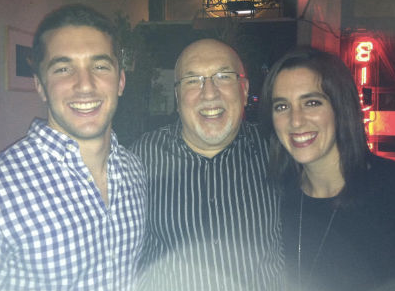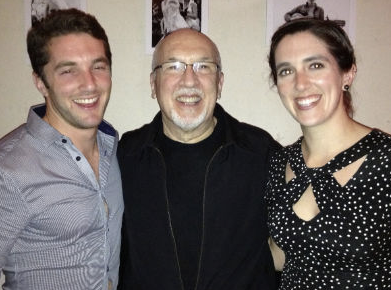I think it's fair to say no one likes weighing themselves. We're so caught up in seeing a "good" number on the scale, more often than not we'd rather not step on it in the first place. For some, this dread is so strong it triggers waves of shame or other emotions that end up only fueling more eating.
But a recent study suggests that a daily weigh-in might prove an effective method for people trying to lose weight. The research focused on two groups of obese and overweight people. The people in one group weighed themselves once a week, the others nearly every day. After six months, the daily weighers lost an average of 6.55 percent of their body weight. The weekly weighers had only shed .35 percent of theirs, Runner's World reported.
Here at Healthy Living, we like to focus on science like this study that encourages steps toward a healthier lifestyle. But before I ever read this data, I believed in daily weigh-ins -- because I have my very own proof!

That's me on the right. I'm with my brother and our father. He weighs almost 193 pounds in this picture. Since he's 5'8", his BMI -- while not the best measure of weight or health -- put him on the verge of obesity at the time.
My role here at Healthy Living assures that I am all too familiar with the risks of that extra weight. I can't say it didn't worry me, but I also can't say I was ever totally honest with Dad about this worry. I didn't know the right way to talk to him about his weight, but I also knew no amount of talking about it with him would spark a change until he was ready to change.
In January, something clicked, and all of a sudden, he was ready. Earlier this month, he weighed in at 155.5 pounds.
At the heart of his inspiring success was a very similar type of self-monitoring as the people in this recent study used. My father weighed himself every morning before breakfast.
"I was able to see immediate progress," he said when I asked him why a daily weigh-in was such a big deal. And how rewarding is that? I didn't know how fast he'd drop pounds and was concerned he might get discouraged if progress was slow, but this way he saw even the littlest wins.
It also gave him some data to work with, he said. "I was able to correlate the previous day's behavior (food intake and exercise) with a result and adjust accordingly." And he did this a lot.
On the days when he gained a little -- and there were those days -- he didn't get discouraged. He realized, as Runner's World points out, that it's crucial to recognize that daily variations could be due to a number of factors, even something as simple as how much water you've had to drink.
Most of the time when the number went the wrong way, Dad knew why. One day, it was three vodkas. Another time, too many carrots. One of my favorites: "freakin' lasagna." And seeing the number edge upward motivated him to make small changes day by day.
He upped the ante by texting each day's weight to my mother, brother and me. While social support isn't covered in this particular study, it is a well-documented indicator of weight loss success. "I was sharing my daily weigh-ins via text with my family, as I needed the accountability," he told me. "I wanted to be healthier for me and them, and I also didn't want to let them down. It was not only fun but proved to be a good way for me as a husband and father to be open about what drove some of my eating behavior."
I interviewed a handful of experts around Father's Day this year about the importance of knowing your dad's medical history. The docs stressed that a lot of fathers don't take the same control of their health that moms might, but that ultimately dads can't take care of their families if they don't care of themselves.
And there's a heck of a lot more taking care of me I'm expecting him to do.
